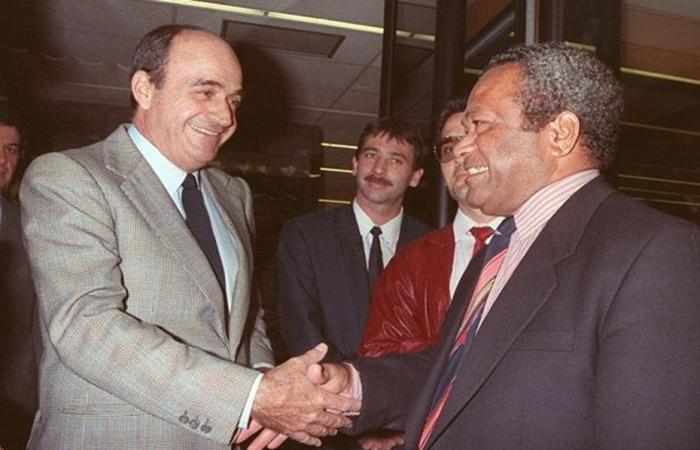Fourteen years after the death of Jacques Lafleur, what remains of his political legacy today? From his commitment in the 1970s to the signing of the Matignon and Nouméa agreements in 1988 and 1998, the founder of the Rally for Caledonia in the Republic (RPCR) left his mark.
“Neither victors nor vanquished”this declaration dates from June 26, 1988, Jacques Lafleur pronounced it after the Matignon agreements. The signing took place in Paris with the independence and non-independence delegations. “We all managed to understand that we had to know how to give but also forgive,” he asserted.
The Matignon Accords put an end to the civil war, after four years of events which
led to the death of 90 people in New Caledonia. The trajectory was therefore set for a return to peace and political stability in Caillou.
Isabelle Lafleur, his daughter, returns to this episode by comparing it to the situation in New Caledonia today. “It was badly received because when you come out of a civil war, the wounds are strong. The things that they were forced to accept from one side or the other are difficult. We’re going to have to deal with this level of resentment right now, it’s something that’s going to be very difficult to get through.I don’t have a choice, I think, we have to do it.”she explained.
Isabelle Lafleur is not the only one to draw inspiration from the past. In mid-November 2024, Nicolas Metzdorf, deputy for the first constituency, praised the work of Jacques Lafleur. “I am convinced that we need to remake the RPCR. We must form a united front like the RPCR was because the situation is serious. We have radical separatists who want to bring Caledonia to the ground”alerted the elected loyalist.
Will this position be shared by other political parties in favor of maintaining the
New Caledonia in France? Nothing is less certain, whether it concerns the two camps, the alliances of yesterday are not necessarily those of today. But when it comes to mentioning Jacques Lafleur and Jean-Marie Tjibaou, the peacemakers are almost unanimous.
“By respecting the convictions of each other, they took the gamble of raising the debate. It is also in the shadow of these examples that we must project ourselves if we want to move towards the ’emancipation of New Caledonia’recognized Emmanuel Tjibaou, deputy for the second constituency.
Discussions on the institutional future of the country are today closely linked to the end of the crisis
economic situation in which the territory has been plunged since May 13. An unprecedented situation which recalls the complexity in which New Caledonia found itself in 1988. All that remains is to find a favorable outcome for future generations like the work carried out by Jacques Lafleur and Jean-Marie Tjibaou.
The political legacy of Jacques Lafleur explained by Natacha Lassauce-Cognard and Cédric Michaut:
©newcaledonia
Belgium






